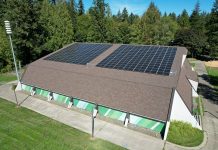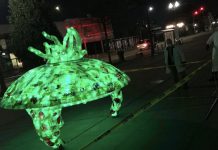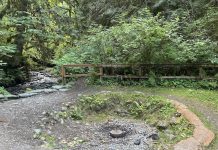The Pacific Northwest, known for its natural splendor and unique wildlife, is in the midst of an environmental crisis. This summer our hearts broke as we watched our Southern Resident orca, J-35, better known as Tahlequah, carry her lifeless newborn calf for an agonizing 17 days. As we followed her journey over the course of 1,000 miles, an intense grief was felt not only throughout the state of Washington, but also on an international level.
People across the world mourned with this mother orca whose “tour of grief” heaved at our heartstrings; scientists expressed their heartache, politicians were inspired to foster change, and human mothers who have lost children of their own felt an interspecies connection to Tahlequah’s anguish. But right here in the South Sound, our beautiful home in the Salish Sea, many local organizations are taking action to help protect our area’s beloved Southern Resident Killer Whales.
The Southern Resident Killer Whales (SRKW), are a large group of orcas made up of extended family that is divided into three different pods: the J, L and K pods. These are the orcas that call our waterways home. The Salish Sea is made up of a network of waterways intertwining the Puget Sound with the Strait of Juan de Fuca and Strait of Georgia. After years of declining numbers in the SRKW pods, their population consists of a mere 74 whales left.
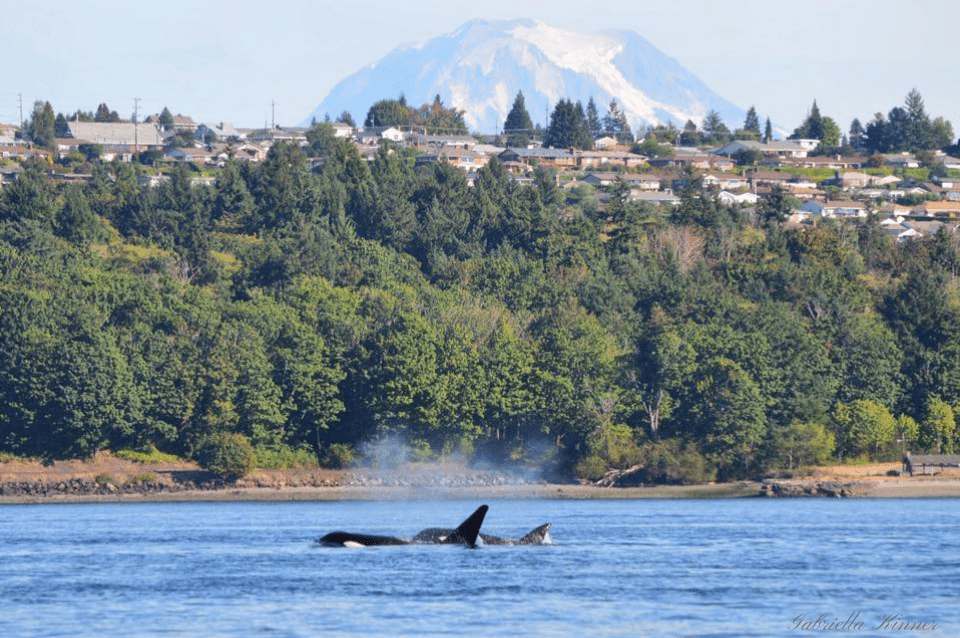
Orcas are no strangers to the Puget Sound, and throughout the year you might just get lucky spotting a pod power their way through our waters. This inspires local organizations like Citizens for a Healthy Bay (CHB) to help educate our communities on what’s happening beneath the water’s surface in the Puget Sound.
“Our main goal is still to empower the local community to stand up and push for effective cleanups, transparent decision-making, and smart, sustainable environmental policies,” Alex Teppert of CHB tells us. “Citizens for a Healthy Bay was formed almost 30 years ago by people who call Commencement Bay home. While still true today, historically, Commencement Bay and Tacoma have been targeted for intensive, polluting industry, and our founding members recognized this.”
Citizens for a Healthy Bay reminds us that orcas are actually a lot like people. “They’re a lot like us. They play, they have language, they have culture, and they have long-lasting relationships with their families,” Erin Dilworth, CHB’s Policy & Technical Program Manager explains. “Orcas are a great indicator species for ecosystem health. If Southern Resident Killer Whale numbers are dwindling, it speaks to a larger, systemic problem – declining salmon and forage fish populations, degraded nearshore and riverine habitat, and toxins in our waters.
Each year, CHB conducts over 100 pollution patrols in Commencement Bay, making them the only environmental organization with a Bay Patrol vessel in the South Puget Sound. By doing so, they are able to quickly tackle any pollution or hazards in the bay that might otherwise be overlooked.
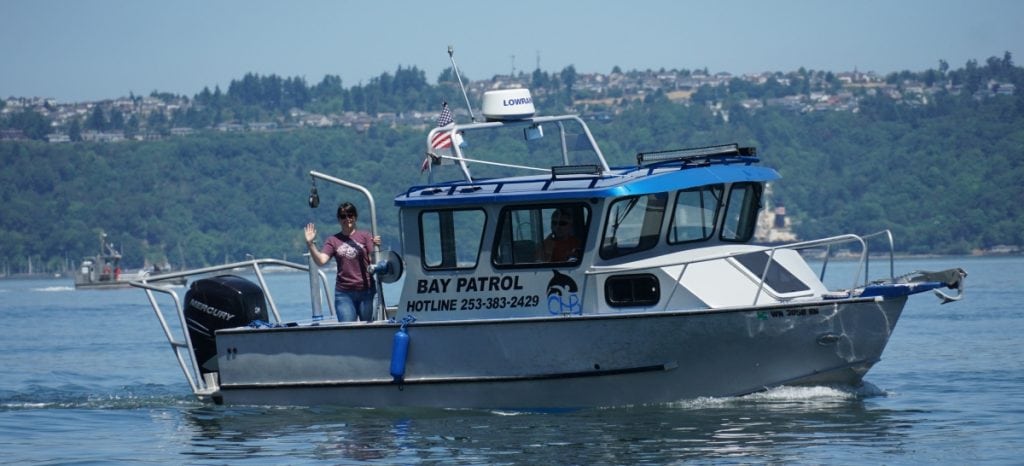
Aside from taking direct action, the team members at CHB are making their voices heard by advocating for the protection and restoration of Puget Sound marine habitats to help increase the population of salmon and other fish in our ecosystem, which are vital to orcas and other marine mammals in our area. You can join Citizens for a Healthy Bay to help make a difference and have fun doing it by becoming a volunteer. Volunteers help with a variety of projects ranging from cleaning up beaches to restoring habitats.
New to Tacoma in 2017, The Whale Trail chose Point Defiance Park to become an official whale sighting location. Originating in Seattle, The Whale Trail is a series of 90 different sites located along the West Coast and Salish Sea, where you can safely view and learn about marine mammals from shore. Their mission is to increase awareness that the Puget Sound is home to orcas, and to connect people to orcas, other sea creatures, and their environment. This provides a way to view these animals without having any impact on them.
“The best place to see whales from Point Defiance is along the north shore, especially near the ferry landing. During fall and winter, you might see resident orcas between Point Defiance and Vashon Island. Gray whales, harbor porpoise, and even minke whales are occasionally observed here. Harbor seals and sea lions are commonly seen,” The Whale Trail states.
The Whale Trail has also teamed up with the Washington State Ferries by installing informative signs on each vessel to help passengers identify the marine wildlife they may encounter on their commute. This information reaches nearly 23 million passengers each year and has been a great example of high impact, low cost results to help raise awareness about our Southern Resident Killer Whales.
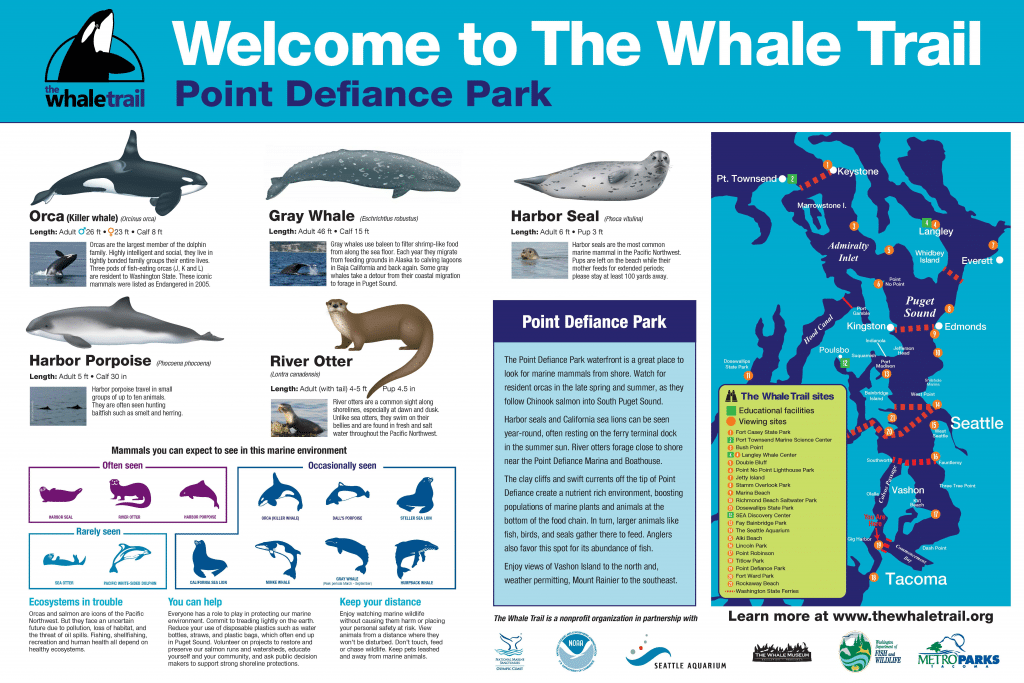
The Harbor WildWatch in Gig Harbor is also dedicating their time and resources to providing environmental education for all, with a mission to inspire stewardship for the Puget Sound and greater Salish Sea. Through their educational programs and events, Harbor WildWatch reaches nearly 30,000 people each year, and provides more than 600 different programs for both children and adults.
“We want to really empower people to make positive change,” Rachel Easton of the Harbor WildWatch tells us. “Through our children’s programs, we have in-school workshops where we go into schools and classrooms. We offer 20 different marine workshops and explain how everything is connected. From the tiniest plankton up to the huge orca whales, we know that they all thrive in clean water, so we provide education around keeping our water clean.”
Harbor WildWatch emphasizes that there are many simply ways that you can take action on your own to help protect our orcas and other wildlife in the Puget Sound.
- Be an ocean-friendly pet owner. Many of us bring our dogs to the beach to play in the water, but it’s important to pick up after our furry friends. Pet waste is harmful to our water supply and contributes high levels of bacteria, which impacts marine mammals more than people realize.
- Peace out, plastic! Did you know that it takes up to 450 years for one plastic bottle to decompose in the ocean? Breaking ties with single-use plastic products sounds harder than it really is. By making the choice to use reusable water bottles and grocery bags, you can help decrease the amount of plastic waste that will end up in the stomachs of whales and fish.
- Get involved. From joining a beach clean-up or engaging in citizen science, to eating sustainably harvested salmon and seafood, and using eco-friendly products that won’t contaminate our water supply, there are endless ways to make a positive impact.
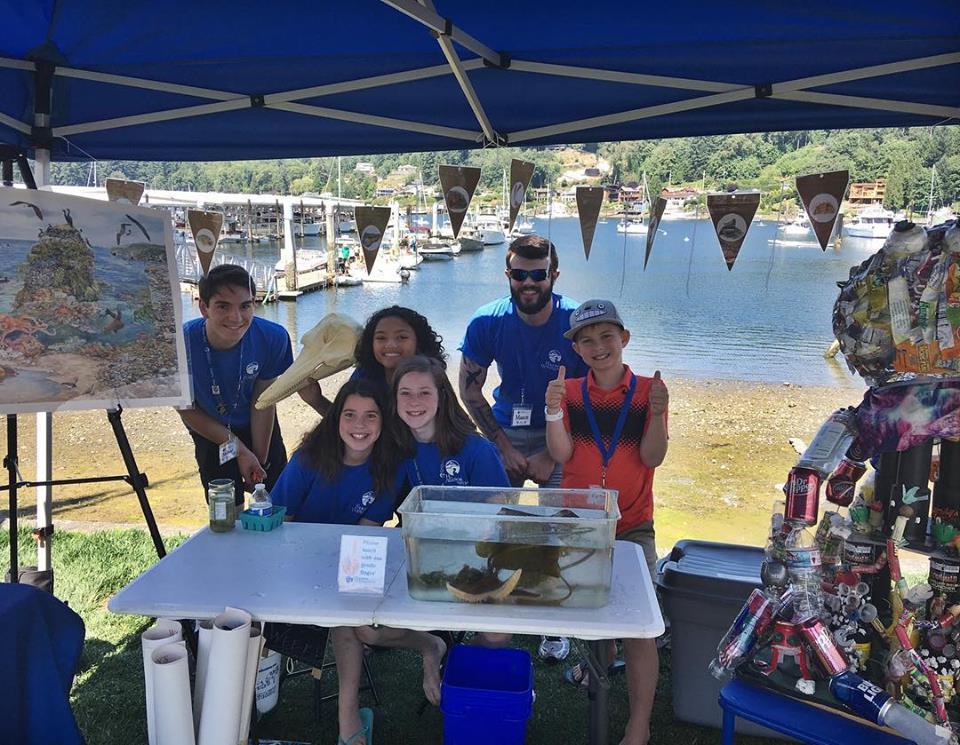
“At Harbor WildWatch, we will educate you and you take the action yourself,” Rachel says. WildWatch offers fun and unique learning opportunities for everyone ranging from walking tours and beach cleanups, to cocktail lectures for adults, and even events featuring a night-time viewing of marine animals using scuba divers, submersible lights and live underwater video feed for the participants to watch on the surface.
Other local businesses, such as Ocean 5 and Table 47, among numerous restaurants around the state, are making the commitment to improve the health of our oceans and marine wildlife by using sustainable products like paper straws, taking Chinook salmon off the menu, and encouraging communities to keeping our environment clean.
With our Southern Resident Killer Whales making national headlines, first with Tahlequah, and now with the death of the young orca J-50, many may be inspired to join in to help our local orcas, whether that means making small adjustments to your everyday actions to joining one the local organizations.








